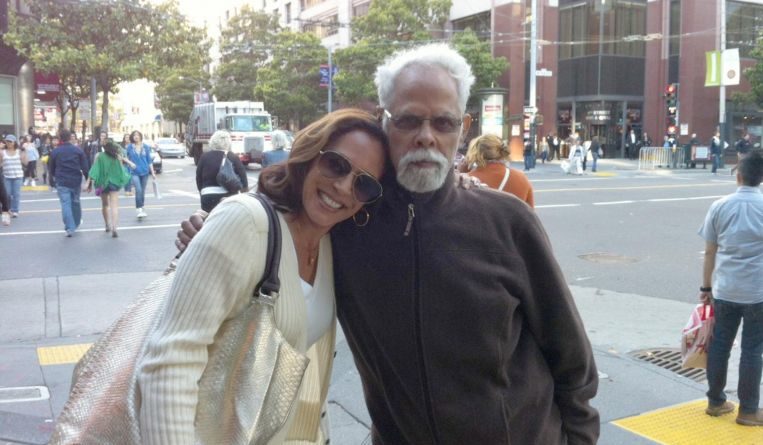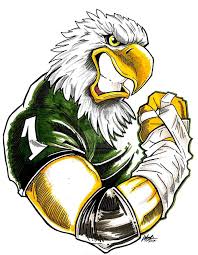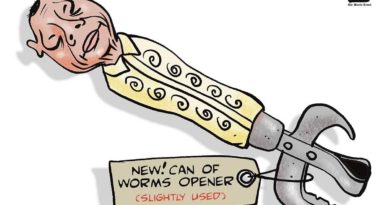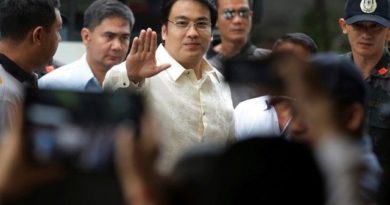US PRESIDENTIAL ELECTION 2020: NEW DELHI – Kamala Harris’ family in India proud of her upwards trajectory
Kamala Harris with her maternal uncle Gopalan Balachandran in San Francisco.PHOTO: COURTESY OF GOPALAN BALACHANDRAN Nirmala Ganapathy/ India Bureau Chief
.
NEW DELHI – Dr Gopalan Balachandran last met his niece Kamala Harris, the presumptive Democratic vice presidential nominee, when she was sworn in as a senator three years ago.
She had invited her maternal uncle, two aunts and a cousin to the ceremony from India and Canada, and also introduced them to then vice president Joe Biden, now the Democratic presidential nominee.
Her uncle, 79, is now hoping to attend another swearing in.
“I was not surprised (by her nomination) because Biden said he was going to choose a woman as his running mate and that it may be African American. She was a very strong candidate. She has a chance of winning,” he said in an interview with The Sunday Times.
Ms Harris’s nomination has triggered a frenzy in India where her Indian roots have been debated and discussed threadbare in news as well as social media.
But none has been proudest than her family in India, which her mother, Shyamala, left at the age of 19 in 1957 to pursue graduate studies in the US.
Over the years, they have followed the upwards trajectory of Ms Harris’s political career.
The 55-year-old senator is the first American of Indian and African descent to run for the post of vice president.
She began her career in the Alameda County District Attorney’s Office and went on to be elected district attorney of San Francisco and then attorney general of California in 2010 and 2014. In 2017 she was elected to the Senate from California.
.


.


Dr Balachandran said his older sister, who died of colon cancer in 2009, was proud of her daughter’s achievements and lived to see her elected as district attorney.
She was Ms Harris’s strongest influence.
At the University of California at Berkeley, Shyamala Gopalan met and married Donald Harris, a student from Jamaica, who went on to teach economics at Stanford University.
The marriage was welcomed by her family, described as “progressive” by Ms Harris, even though India was and remains in many parts deeply conservative, particularly about inter-racial unions.
The pair had two daughters but divorced when Kamala was seven and Maya, four. Mrs Harris, who was a breast cancer researcher, became the driving force in her children’s lives.
“She made them aware of their Indian roots. But she impressed upon them that they would be looked upon as African Americans and treated as such. She used to take them to all the civil rights demonstrations even when they were kids,” said Dr Balachandran, a former consultant with the think tank Institute for Defence Studies and Analyses in New Delhi.
Ms Harris wrote in her 2019 memoir, The Truths We Hold, that her mother “understood very well that she was raising two black daughters” and raised them to be “proud black women.”
“You can’t know who Kamala Harris is without knowing who our mother was,” her sister, Maya, tweeted on Aug 12, a day after Mr Biden announced his running mate. “She and the ancestors are smiling today.”
.


.


His sister, Dr Balachandran said, had a vast library, including simplified texts of the Ramayana, a Sanskrit epic. This helped the girls, who grew up in a predominantly Black neighbourhood, imbibe the Indian part of their heritage, also reinforced through many visits to India.
The vice presidential nominee’s interactions with her grandfather P.V. Gopalan, a civil servant and another influential person in her life, may also have shaped her political views on human rights and other issues. He was a strong proponent of civil rights.
Dr Balachandran said Kamala and her sister would be full of questions about their Indian heritage, such as why coconuts were broken in temples.
“She (Kamala) was quite comfortable (in Chennai). She didn’t say, what is this heat. She liked South Indian food ..rasam sambar idli, but then so did my sister and everybody else (in the family)!”
After her mother’s death,Ms Harris travelled with her sister and niece to Chennai to immerse the ashes in the Bay of Bengal.
In Hindu religion, the mortal remains of the dead are cremated and then the ashes are immersed in rivers or other bodies of water.
The Indian side of her family remains a melting pot. Dr Balachandran’s daughter, Sharada Balachandran Orihuela, is assistant professor of English and comparative literature at the University of Maryland. She is married to a Mexican.
.


.


Another of his sisters settled in Canada.
“Our family is very diverse. when everyone got together, it was a global village,” said Dr Balachandran.
In India, debates about Ms Harris’s nomination have also touched on how India-US ties, already strong, could be nurtured under a presidency that included an Indian American.
On Friday, the ministry of external affairs spokesperson when asked a question on her nomination, declined to comment, saying the government would not like “to comment on the electoral process of any other country”.
Still leading political figures have welcomed the nomination.
Tamil Nadu deputy chief minister O. Panneerselvam said her nomination is a “moment of pride” for Indians, particularly Tamils.
Others have joked that Ms Harris has raised the bar on achievements by the Indian American community.
“&the prospect of a half-desi a proverbial heartbeat away from the presidency is thrilling,” tweeted Congress MP Shashi Tharoor.


SIGN UP TO RECEIVE OUR EMAIL
.
The most important news of the day about the ASEAN Countries and the world in one email: [email protected]
8.16.2020










